In Rituparno Ghosh’s 2003 adaptation of Rabindranath Tagore’s 1903 novel “Chokher Bali,” Ghosh manages to remain adequately loyal to the Nobel Laureate’s vision while also positioning himself as a retrospective co-scripter of the narrative, looking at it from where he is situated nearly a century later. Ghosh approaches the novel intertextually to create a score that incorporates songs from the rest of Tagore’s corpus of work, and he does so deftly.
Notably, the score contains one record, in particular, that perfectly captures the essence of Ghosh’s adaptation – a blend of two distinct but musically similar songs. The first, “Era shukher lagi chahe prem,” is about the futility of trying to bank upon romantic validation for the sake of happiness, and the second, “Aaji Bangladesher hridoy hote,” is about national pride and awe at the bounty of the mother goddess, the personification of the nation. These themes are what constitute Ghosh’s reading of the novel – an account of how national politics can and do distil into microcosmic interpersonal relationships.
Chokher Bali is culturally reflective, immensely nuanced, and is set during an especially tumultuous period in Bengal’s history, when Lord Curzon, the then Viceroy of British India, sought to divide Bengal (which encompassed present-day West Bengal, Bangladesh, Orissa, Assam, Bihar, and parts of Chhattisgarh) along religious lines.
Nationalist movements emerged against this reorganisation and Bengal essentially had two faces – one that strove to eliminate foreign administrative forces that had very clear ulterior motives, and another that was in constant dialogue and cultural exchange with Europe, exemplified by (among several other instances) Ghosh’s employment of Robert Burns’ Auld Lang Syne in the film which Tagore had adapted into a Bengali song called Purano Shei Diner Kotha.
At the centre of the narrative is Binodini (Aishwariya Rai), a young Convent school-educated woman who would be considered exceedingly virtuous by the standards of the time and despite that, is rejected by both, Mahindra (Prosenjit Chatterjee) and his friend Behari (Tota Roy Choudhury) as a prospective wife. The man she marries passes away in a year leaving her grappling with a society that ostracises widows as a rule. She is invited to live with Mahindra’s mother, Rajlakshmi (Lily Chakravarty) who takes a liking to her, and forms a close bond with Mahindra’s young wife, Ashalat (Raima Sen).
The film revolves around her friendship with Ashalata, her intellectual relationship with Behari, and her extramarital affair with Mahindra.
Language and politics in Chokher Bali
A lot of the film’s discourse hinges on the issue of women’s literacy, or more specifically, the English language and the implications a knowledge of it entails for people from various strata of society. “None of Bankim’s women know English,” says Mahindra to his mother and Behari in lieu of a critique of the author’s characterisation of his widowed female characters.
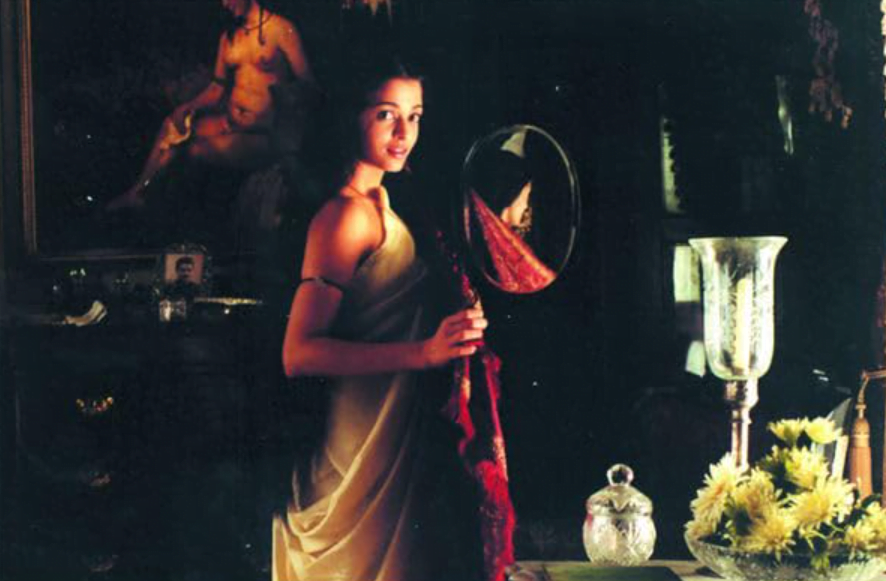
The English language takes on various forms in the film – that of a facilitator of social elevation, of an instrument of deception, of turf for revolution, and a harbinger of calamity.
When Ashalata expresses a desire to learn English to her widowed aunt, the latter rebukes and chides her saying learning English will render her a widow. Ashalata in turn, when she first meets Binodini who is clad in the colourless attire of widowhood and effortlessly converses with an Englishwoman, asks her if no one had told her what happens if a woman learns English, and seems to attribute her fate to the fact that she had not heeded this particular instruction.
When Ashalata, in her naivete, proclaims that whatever happens happens for the best, Binodini asks her if her husband dying within a year of marriage also happened for the best. “Really,” says Ashalata, missing the point, “Why did you have to go and study English?”
Ashalata’s innocent apprehension about the language, however, was rivalled by Binodini’s deep-seated belief that she deserved to be able to run a household of her own because she was educated, and that somehow made her a better candidate for it, and a better wife for Mahindra, who wrote English poems about his wife that Ashalata did not understand.
When Behari, who partakes in a lot of nationalist movements comes to Binodini to get her signature on her petition, she remarks on the irony of protesting against the English language in English. “The English do not understand if you do not use their language,” says Behari wryly.
Interestingly, Behari and Mahindra also switch to English in one scene when they do not want Ashalata to understand what they are talking about, and that is, of course, because they are talking about Mahindra’s questionable relationship with Binodini. Their knowledge of the language allows them to determine if they want to let Ashalata in on a conversation that concerns her.
Portrayal of women and widowhood
Her status as a widow deprives Binodini of a lot of basic claims to liberty. Going against the norms put in place for widows like her necessarily earns her a lot of judgment. Therefore, despite her transgressions, she still has an empathiser in Ashalata’s aunt, Annapurna (Shuchita Ray Choudhury), who reminds an aggrieved Ashalata that although she might think that her humiliation at her husband leaving her for another woman might seem more painful to her than Binodini’s plight, there is nothing that comes close to being a social outcast. She also has a sympathiser in Behari, who asks Mahindra to feed widows instead of Brahmins as part of the rituals after Rajlakshmi’s death.
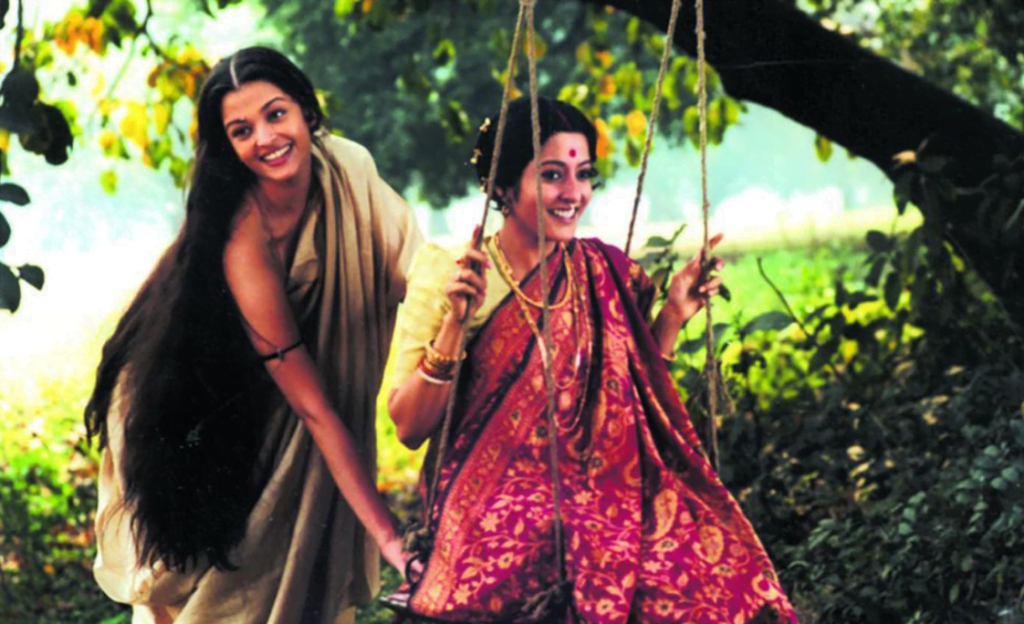
And yet, Ghosh’s portrayal of Binodini, despite being empathetic is not overly indulgent. She yearns to be understood, but cannot stand to be pitied. She is not the “seductress” that people might want to think of her as, but she is not an innocent victim of her circumstances either. She is simply trying to navigate the life fate has afforded her and she does questionable things which are borne out of the injustice meted out to her. Her actions and reactions may have no excuse but they have an explanation.
To the jury in the audience that is interested in judging her, Binodini successfully comes across as an ordinary flesh-and-blood human, and they feel for her when she gazes wistfully at Ashalata washing her face after Sindur-Khela – the tradition of married women smearing vermillion on each other on the final day of Durga Puja.
A festival that Binodini is not allowed to partake in on account of her widowhood. She does not as much wish for male validation as she aspires to upward social mobility, and to a lot of privileges that marriage used to afford a woman in those days that Ashalata seems to take for granted.
Therefore, Binodini is flawed and Ghosh is not interested in rendering her beyond reproach due to her plight. She is deeply acerbic when she feels attacked, and she often does. Rajlakshmi, who had taken a liking to tea after Binodini convinced her that it was not a sin for a widow to drink it, entreats her to make her tea in secret, and it is heartwrenching to see how guilty she feels indulging in small pleasures.
However, when she confronts Binodini about her relationship with Mahindra and how that drove Ashalata to Kashi, Binodini does not hesitate before reminding her of her petty transgressions. She similarly does not even flinch before she attacks Behari’s masculinity when he rejects her advances. She is a product of her circumstances – intelligent yet vitriolic, resentful yet longing for human connection, a heroine yet profoundly human.
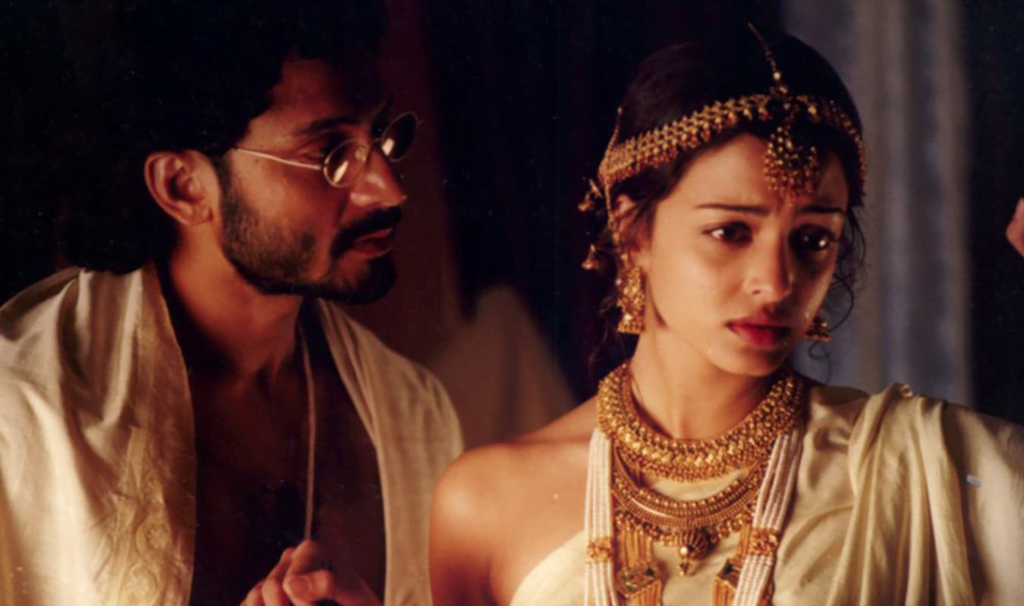
At several points in the film, someone closes the door to a room to prohibit entry to someone else. Binodini flinches when Mahindra and Ashalata close their door for the night conveying that she might get close to the pretence of a normal domestic life, and even partake in the duties of a regular household but there are some spaces that she will never gain access to and has no right to. Rajlakshmi and Annapurna also seem to have a problem with Mahindra and Ashalata keeping their doors locked past sunrise.
Interestingly, in the one scene in which the widowed women in the house try to create a private sphere of their own in a locked room while they secretively drink tea, Behari comes knocking aggressively on the door, hence depriving them of their secluded sphere where they were starting to feel comfortable. Thus, privacy in general is frowned upon, and when it is tolerated, it is a privilege meant for only a select few
Binodini and Ashalata shut the door as Annapurna, Ashalata’s aunt, watches; they have a private sphere of their own that no one else, not even Mahindra, is allowed in. Mahindra and Behari shut the door to disallow entry to the women that they are discussing. The line between the in-group and the out-group could not be clearer, and although the divide between the private and the public is to be expected, it often does not help one’s burgeoning sense of alienation. And it is fitting that most of the conflicts in the film arise when these literal and/or figurative doors that guard the personal and the secretive, are sent flying open. This also takes place against the larger backdrop of the British Empire’s incursion into native spaces.
Nearly all of the characters seem to be wanting to exclude someone, or struggling to assert their right to privacy which none of them are afforded, least of all Binodini. Her grief must be public and on display, declared to the entire world with her garb and her lifestyle, and she is not allowed to have more to her than meets the eye.
Interestingly, in the one scene in which the widowed women in the house try to create a private sphere of their own in a locked room while they secretively drink tea, Behari comes knocking aggressively on the door, hence depriving them of their secluded sphere where they were starting to feel comfortable. Thus, privacy in general is frowned upon, and when it is tolerated, it is a privilege meant for only a select few.
Notion of nation
Throughout the film, Binodini and Ashalata, like many female friends of that era who used to give each other pet names, call each other “Bali,” short for “Chokher Bali,” which means “a grain of sand in the eye,” or as a lot of translations of Tagore’s original work term it, “an eyesore.” They decide upon this ironic name of mutual affection while jesting about how they could have been friends, but their association with Mahindra would conventionally require them to be co-wives.
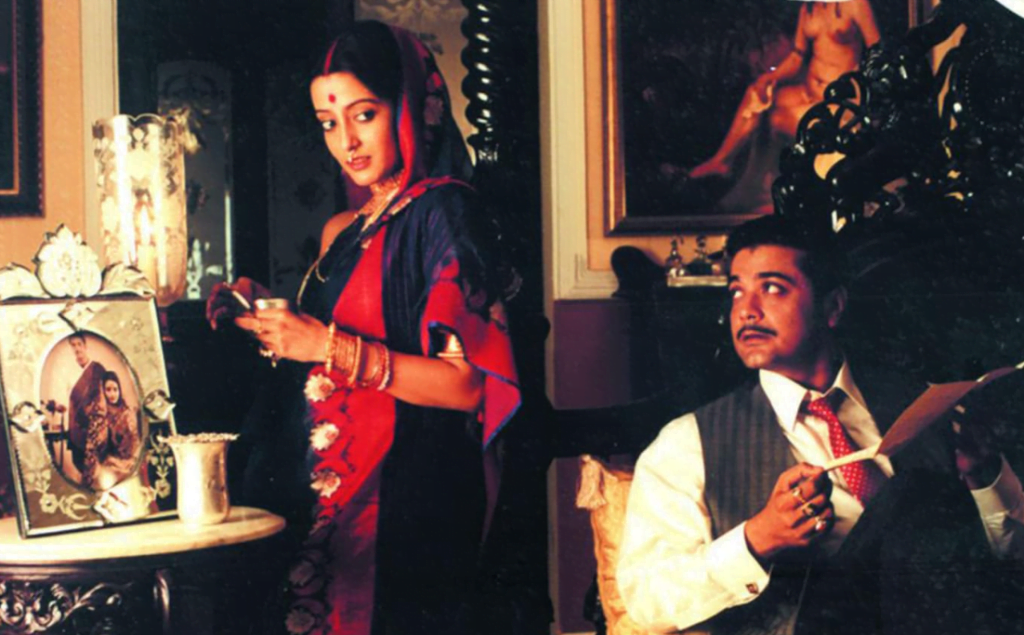
While Tagore’s novel is described by several readers as an account of an extramarital affair between Mahindra and Binodini, Ghosh’s postcolonial feminist adaptation can only be described as the story of an ardent female friendship between Binodini and Ashalata gone awry due to forces that were outside their control, of a figurative nation broken by external agents.
The film ends with Ashalata reading the last letter Binodini ever wrote her. “You used to ask me what a nation is, Bali,” Binodini writes. “You used to ask me which nation they are fighting for.” In line with the Andersonian conception of a nation as an imagined community, Ghosh has Binodini submit to Ashalata that their relationship, their “little room in the two-storeyed house on Darjipara street,’ had been their nation.
Once presented with the opportunity to get remarried to either Mahindra or Behari, both of whom had rejected her previously, Binodini decides that there is more to life than the dreams fed to her by a society that thought a woman’s life virtually begins and ends with her marriage. She begs Ashalata not to keep her child sequestered in the house on Darjipara Street and let them know that there is a world outside it, a notion that neither she nor Ashalata was permitted to entertain, which resulted in them vying for the only man they thought could offer them the sort of security that they had been taught they should prize over all else.
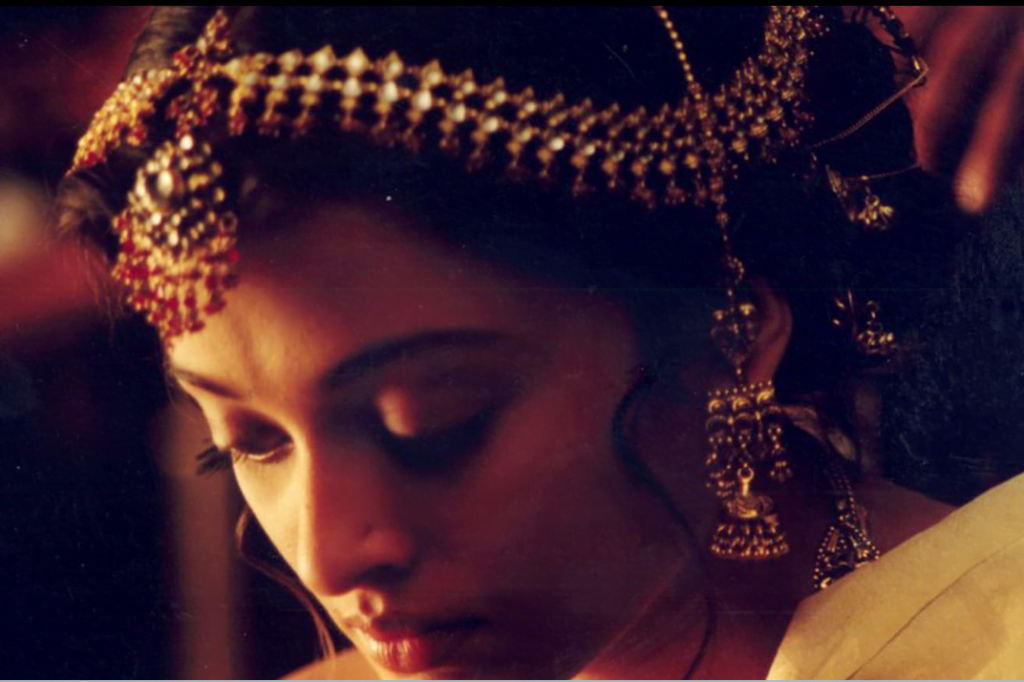
If Bengal comes to be partitioned, Binodini writes to Ashalata, we will be living in two different nations, but if our notion of our nation is intact, what could Lord Curzon possibly do to us?
Ashalata asks Behari if the Swadesis are fighting in vain, and remarks that what is meant to break will break anyway, and Ghosh tells the viewer who is unaware of the route history took, that Bengal was eventually divided along religious lines in 1947, conferring premonitory wisdom upon Ashalata who was chided and ridiculed for not being educated throughout the film.
By placing these women’s stories against the political context of the partition of Bengal, he punctuates the point that Bengal could not be protected from the partition due to invasive and divisive colonial powers, and Binodini and Ashalata never meet again due to incendiary and restrictive patriarchal ones.
Ghosh’s adaptation of “Chokher Bali” is nostalgic, evocative, and contemporary all at the same time. Through it, he is in conversation with Tagore. Through it, he comments on history with a critical yet faithful lens. Through it, he contextualizes Tagore’s work within the twenty-first century and still retains its essence. His interpretation, it can be argued, may have indelibly changed how readers will approach the original text for many years to come, and with it, he reminds us that perception is indeed production, that a protagonist is indeed a person, and that the personal is indeed political.
About the author(s)
Adrita Bhattacharya is a Computer Science graduate from Vellore Institute of Technology and is currently pursuing a degree in English and Cultural Studies at Christ University. She has a keen interest in Linguistics, Gender Studies, and Digital Humanities.





